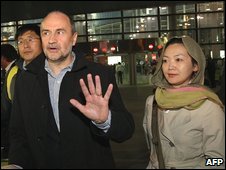 A team from the UN's nuclear watchdog has inspected a previously secret uranium enrichment plant in Iran, Iranian officials and media have said.
A team from the UN's nuclear watchdog has inspected a previously secret uranium enrichment plant in Iran, Iranian officials and media have said.
The inspectors from the International Atomic Energy Agency are expected to visit the facility, near the holy city of Qom, again over the next two days.
The visit comes as world powers await Iran's response to a new proposed deal over its uranium enrichment programme.
Iran would send some enriched uranium to Russia to be turned into fuel.
The proposed deal is seen as a way for Tehran to get the fuel it needs for an existing reactor, while giving guarantees to the West that its enriched uranium will not be used for nuclear weapons.
But opposition inside Iran to the agreement is said to be growing.
'In jeopardy'
Sunday's inspection was the first time monitors from the IAEA had been allowed access to Iran's second enrichment facility, which is being built into a mountainside 160km (100 miles) south of Tehran.
Iran agreed to open the new site to monitoring at talks with the five permanent members of the UN Security Council plus Germany in Geneva on 1 October.
BBC Tehran correspondent Jon Leyne says the Iranian government announced the existence of the new plant last month, apparently because Western intelligence agencies had already discovered it.
But having had weeks before the first inspection, the Iranians would have had plenty of opportunity to remove anything there that might have been incriminating, our correspondent says.
On Saturday, the White House said Barack Obama had telephoned French President Nicolas Sarkozy and Russian President Dmitry Medvedev to thank them for their countries' roles in developing the latest plan on Iran's enriched uranium.
Under the deal, most of Iran's low-enriched uranium would be exported to the IAEA and sent to Russia for further enrichment and on to France for refinement.
Iran would get the fuel it needs for a research reactor in Tehran that makes medical isotopes, but this would not be sufficiently enriched to make a nuclear weapon.
It has said it will respond to the offer by the middle of next week.
The White House said the US, French and Russian leaders had all "affirmed their full support" for the deal.
Iran says its nuclear programme is for purely peaceful purposes but the revelation of the existence of the new plant near Qom had increased fears in the West about Tehran's intentions.
Our correspondent says that there has also been a setback in Iran to the IAEA deal.
The speaker of parliament, Ali Larijani, and two other senior parliamentarians have expressed opposition to Iran allowing its enriched uranium to leave the country.
"Westerners are insisting on going in a direction to cheat and impose their will on us," the Isna news agency quoted Mr Larijani as saying.
If Iran rejects that key element of the agreement, it will place both the entire deal and the process of negotiating with world powers on its nuclear programme in jeopardy, our correspondent adds.


